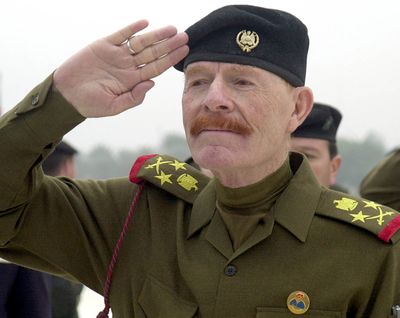Saddam’s top deputy killed, Iraqi officials say

BAGHDAD – He was the last member of Saddam Hussein’s inner circle still on the run, depicted with his distinctive red moustache as the “king of clubs” on the U.S. military’s deck of cards of most-wanted Iraqi regime fugitives.
Now, officials say they believe government forces killed Izzat Ibrahim al-Douri near Tikrit, where the former deputy to Saddam was working alongside Islamic State militants.
Reports of al-Douri’s death came Friday as Iraqi forces tried to push back Islamic State group fighters in Salahuddin province, where Tikrit is located. Government troops took back several towns near Iraq’s largest oil refinery at Beiji, officials said.
Farther north, a car bomb exploded next to the U.S. Consulate in the city of Irbil, a rare attack in the capital of the Kurdish autonomous zone that killed three people and wounded five, police said. U.S. officials said no Americans were hurt and that there were no casualties among consulate personnel or guards.
The report of al-Douri’s death was not the first time Iraqi officials have claimed to have killed or captured the 72-year-old former aide to Saddam.
According to Raed al-Jabouri, the governor of Salahuddin province, al-Douri was killed by Iraqi troops and Shiite militiamen in an operation in the Talal Hamreen mountains east of Tikrit, Saddam’s hometown, which was retaken from the Islamic State group earlier this month.
Troops opened fire at a convoy carrying al-Douri and nine bodyguards, killing all of them, Gen. Haider al-Basri, a senior commander, told state TV.
The government issued several photos showing a body purported to be al-Douri. Karim al-Nouri, a spokesman for the Popular Mobilization Forces, said the body was brought Friday night to Baghdad for DNA tests, which should be completed within 48 hours. Col. Pat Ryder, spokesman for U.S. Central Command, said the U.S. had no information to corroborate the reported death of al-Douri.
Al-Douri was officially the No. 2 man in Iraq’s ruling hierarchy. He served as vice chairman of Saddam’s Revolutionary Command Council, was one of Saddam’s few longtime confidants, and his daughter was married briefly to Saddam’s son, Odai, who was killed with his brother, Qusai, by U.S. troops in Mosul after the U.S.-led invasion in 2003.
During the war, coalition troops were issued decks of playing cards with the names and faces of many of the most-wanted Iraqis on each one. Saddam was the ace of spades, Odai was the ace of hearts, and Qusai was ace of clubs. Depicted on the cards as the king of clubs, al-Douri was shown in a photo with his red moustache, saluting smartly in his military uniform.
When the Baathist regime collapsed as U.S. troops occupied Baghdad, al-Douri disappeared.
Initially, he was No. 6 on the most-wanted list of 55 Iraqis after the invasion.
After Saddam was captured and put to death months later and more regime figures were caught, al-Douri became the most prominent fugitive. U.S. authorities soon linked him to the Sunni insurgencies that erupted against the American occupation and the Shiite-led government that replaced Saddam. A bounty of $10 million was placed on his head.
Early in the war, U.S. authorities linked al-Douri to Ansar al-Islam, a militant group with ties to al-Qaida, and he was accused of being a major financier of the insurgency. Former officers from Saddam’s military and police were believed to have played large roles in the insurgency, whether with al-Qaida or other factions.
Al-Douri emerged as a leader of the shadowy Army of the Men of the Naqshabandi Order. The group portrays itself as a nationalist force defending Iraq’s Sunni minority from Shiite rule and as an alternative to the extremist version of Islam championed by al-Qaida.
The Islamic State group – the successor to al-Qaida’s branch in Iraq – launched a blitz last year across much of western and northern Iraq, and al-Douri, the Naqshabandi Army and other former Saddam-era officers reportedly entered a shaky alliance with it.